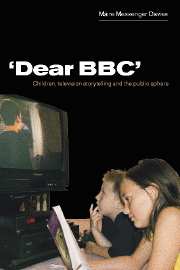Book contents
- Frontmatter
- Contents
- List of tables
- Acknowledgements
- Introduction
- Part I Broadcasting institutions and childhood
- 1 Children and broadcasting in the 1990s
- 2 The importance of television storytelling
- 3 Changing childhood
- 4 ‘Dear BBC’: Children's relationship with broadcasters – the consumer child
- Part II The social functions of broadcasting
- Part III The art of television
- Conclusion: children and television drama – narrative closure?
- Appendix 1
- Appendix 2
- References
- Index
4 - ‘Dear BBC’: Children's relationship with broadcasters – the consumer child
Published online by Cambridge University Press: 12 October 2009
- Frontmatter
- Contents
- List of tables
- Acknowledgements
- Introduction
- Part I Broadcasting institutions and childhood
- 1 Children and broadcasting in the 1990s
- 2 The importance of television storytelling
- 3 Changing childhood
- 4 ‘Dear BBC’: Children's relationship with broadcasters – the consumer child
- Part II The social functions of broadcasting
- Part III The art of television
- Conclusion: children and television drama – narrative closure?
- Appendix 1
- Appendix 2
- References
- Index
Summary
Dear Children's Television, could you please put more programmes about art on television. I really love art and I want to improve my art skills. Can you also put Ace Ventura Pet Detective on another day because on Monday and Wednesdays I have swimming lessons.
Boy, 9, inner-city primary school, CardiffThe quotation above raises a number of questions about the preoccupations of the child as consumer of media. This 9 year old was taking the opportunity, offered by our questionnaire, to make his needs and desires as a consumer known. However, given that he addresses ‘Children's Television’ as ‘dear’, and then goes on to confide, with intimacy, his loves and aspirations to this ‘dear’ entity, the perception of the relationship he has with ‘Children's Television’ is not that of a customer ordering a desired object from a sales representative. ‘Children's Television’ is addressed by this child as a person in whom he feels he can trustingly confide, capable of understanding allusions to swimming lessons, and interested in hearing about his love of art, as well as being able to meet media consumption demands. The provider of children's television appears to have a quasi-parental role and is thus seen as a provider for other kinds of needs as well, including intimacy and mutual trust.
Problems of the child as consumer
Despite the benevolent perception of the broadcasting provider revealed above, the child's role as consumer has been the subject of adult contention since the early days of television, although most research has focused on the impact of television advertising rather than on the child as a consumer of the medium itself (see, for example, Gunter and Furnham, 1998).
- Type
- Chapter
- Information
- 'Dear BBC'Children, Television Storytelling and the Public Sphere, pp. 98 - 124Publisher: Cambridge University PressPrint publication year: 2001

